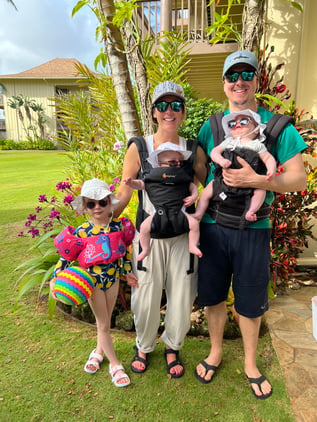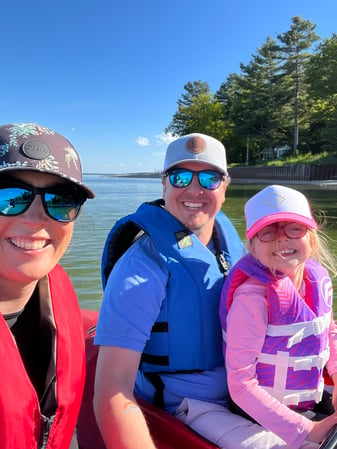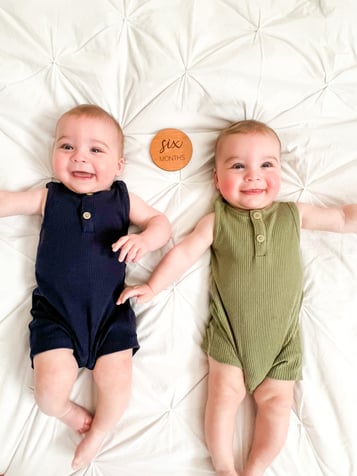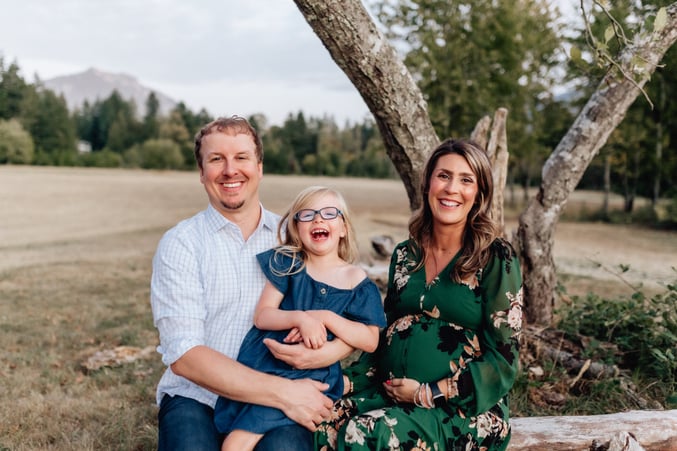 As we celebrate Mental Health Awareness Month, we are reminded of the importance of sharing our stories and experiences. In this edition of #PGProfiles, we are honored to highlight Jen Pasquier, a working mom who is bravely navigating the challenges of postpartum anxiety and depression while balancing the demands of returning to work after having twins.
As we celebrate Mental Health Awareness Month, we are reminded of the importance of sharing our stories and experiences. In this edition of #PGProfiles, we are honored to highlight Jen Pasquier, a working mom who is bravely navigating the challenges of postpartum anxiety and depression while balancing the demands of returning to work after having twins.
She is here to inspire you through her experience and help break the stigma surrounding perinatal mental health disorders. Join us as we delve into Jen's journey and gain insight into the realities of the juggle that is motherhood and mental health.
Tell me a little bit about yourself.
 I live in the beautiful Pacific Northwest (Seattle Area) with my family - my husband, daughter, twin boys, chocolate lab, and cat. I love being outdoors riding a bike, taking walks/hikes, and decorating the driveway with sidewalk chalk as bubbles float around courtesy of my daughter. I also love to travel and have been to some amazing places (Alaska, northern Michigan, Kauai) recently. One of my favorite parts of traveling is trying delicious local foods and doing a bit of shopping.
I live in the beautiful Pacific Northwest (Seattle Area) with my family - my husband, daughter, twin boys, chocolate lab, and cat. I love being outdoors riding a bike, taking walks/hikes, and decorating the driveway with sidewalk chalk as bubbles float around courtesy of my daughter. I also love to travel and have been to some amazing places (Alaska, northern Michigan, Kauai) recently. One of my favorite parts of traveling is trying delicious local foods and doing a bit of shopping.
Entering the month of May has caused me to self-reflect on a few big moments in my life as of late.
May has always been a month that brings me a step closer to my favorite time of year – summer. My birthday is in the summer, I love warm weather and watermelon, and the sun shines more days than not in the PNW. Since 2017, May has been a special month because we celebrate Mother’s Day, and that’s the year I became a mom for the first time. Fast forward to 2023, and I’ve just returned from my second parental leave after having twins – now a mom of three.
In May we also highlight Mental Health Awareness Month, and World Maternal Mental Health Day on May 3. In years past, these were occasions that, for me, would come and go with some discussion around mental wellness and self-care, and maybe some mindfulness activities but really didn’t go much deeper. As a working mom, of course, I experience stress and some anxiety, but I’ve been able to manage that with coping skills like exercise and getting outside. This year, that changed.
How long have you worked at PG and what has kept you here?
I began my career at PG in 2008 - my second job post-college - when we were still relatively small. I joined the local team as a Recruiter and then spent some time on our Payroll Operations team before ultimately landing on the marketing team. I've been leading our marketing efforts for the better part of 10 years and have gotten to do a lot of really cool things in that time, namely:
- Build a team of Marketeers to support our business, and evolve our team to align to better serve our mission to help PG grow
- Develop and launch our ongoing marketing strategy
- Lead the company through a rebrand
- Lead the launch of The Gift of Struggle in collaboration with PG prez, Bobby Herrera
- Help to shape our culture and participate in spaces like Employee Resource Groups, our DE&I council, and leadership development
 My career at PG has spanned almost 15 years in total, and I’ve been a mom for almost six of those. I’ve found my balance between home life and work life (team one and team two as we call them) and have poured myself into supporting our community of working parents by way of our PG Parents Employee Resource Group. I’ve developed a passion for supporting others as they prepare to become moms, whether for the first time or the fifth. As new parents, but especially as new moms, there are so many changes that you experience when growing your family. Navigating those changes while working outside the home can be complex and is an ongoing process. My identity at work isn’t just centered around leading my team of Marketeers and the amazing and impactful work we do; it’s deeply rooted in creating a more inclusive, equitable, and safe environment for working parents to thrive.
My career at PG has spanned almost 15 years in total, and I’ve been a mom for almost six of those. I’ve found my balance between home life and work life (team one and team two as we call them) and have poured myself into supporting our community of working parents by way of our PG Parents Employee Resource Group. I’ve developed a passion for supporting others as they prepare to become moms, whether for the first time or the fifth. As new parents, but especially as new moms, there are so many changes that you experience when growing your family. Navigating those changes while working outside the home can be complex and is an ongoing process. My identity at work isn’t just centered around leading my team of Marketeers and the amazing and impactful work we do; it’s deeply rooted in creating a more inclusive, equitable, and safe environment for working parents to thrive.
Speaking of being a working mom, what's a pivotal moment in your career?
I've had a few of these moments throughout my time here, but one very recent experience stands out.
In the fall of 2022, I was planning for maternity leave, doing all the things one does when preparing to be away for an extended time. I made sure my team was fully staffed, spent as much time with them as possible, handed off projects, and left them with a plan to keep working towards in my absence. Even though I could’ve used more time to prepare, I felt confident about leaving my team and Populus Group in a good place while I was out. Since I was expecting twins, I anticipated leaving work before my due date and taking a longer leave to adjust to my family’s new normal.
 We welcomed our twins in November and I spent the first six weeks or so absolutely over the moon in love with my new family of five. I missed my team, and talking to other adults aside from my husband, but felt comfortable and confident in this new phase of my motherhood journey. I kept thinking how magical it was to have two new babies with a doting big sister through the holiday season. I’d look at my boys and think about what a miracle babies are, and all the stars that had to align just perfectly to create and birth two healthy babies overwhelmed me with deep love and joy. I also felt like a superhero when reflecting on the feat of carrying and birthing two babies.
We welcomed our twins in November and I spent the first six weeks or so absolutely over the moon in love with my new family of five. I missed my team, and talking to other adults aside from my husband, but felt comfortable and confident in this new phase of my motherhood journey. I kept thinking how magical it was to have two new babies with a doting big sister through the holiday season. I’d look at my boys and think about what a miracle babies are, and all the stars that had to align just perfectly to create and birth two healthy babies overwhelmed me with deep love and joy. I also felt like a superhero when reflecting on the feat of carrying and birthing two babies.
As we adjusted to our new routines, friends, and family would check in on us, drop off meals, or offer to run errands for us. I got used to people asking how the babies were doing and was reassured when they also asked how I was doing. “Good!” I’d tell them, and for a while that was true. I can’t pinpoint the exact day, or how old the twins were, but at some point, all of this changed.
How did you recognize that you were experiencing postpartum depression, and how did you seek help?
For me, it wasn’t one specific moment, more like a gradual transition. The sleep deprivation began to catch up with me and the relentless baby-related tasks seemed never-ending. We were deep in the trenches of the newborn stage, this time with two. As a new mom, you know to look out for the baby blues, and at follow-up appointments, you complete a questionnaire to assess your mental health. You’re even reminded of the signs and symptoms of postpartum depression and anxiety by your care team including your pediatrician. Things like trouble sleeping or eating (too much or too little), constant worrying, not being able to relax, feeling isolated or alone, trouble bonding with your babies, irritability or anger, overstimulation, intrusive thoughts about the safety of your babies, and fear that you may hurt yourself or your babies. I experienced all these symptoms.
I realized that how I was feeling was more than just a couple of bad days. I wasn’t myself, and I struggled to care for myself and my babies. I tried to convince myself that I was ok, that I could take a walk, or run an errand to get a break from the chaos. I remember feeling like I was being pulled downwards into myself, that my brain was always on, and that it felt like it was going to physically break.
What I worried about wasn’t just what was happening in the current moment, but what was going to happen in the future. I started to obsess over schedules, “If the boys wake up at 4:30 am and we can’t get them back to sleep, how will I ever get enough sleep to function? How will I have time to take a shower before my husband leaves for work? How can I possibly go back to work, do my job, and lead my team when I’m so exhausted and can’t think straight?” I felt like I had to solve all these problems alone, and I began to resent the people around me.
I was struggling and needed help. As strong and resilient as I believe myself to be, this was a challenge that I couldn’t face on my own, even with the support of my truly amazing husband. I reached out to my care team and their response was immediate. I was instantly connected with a specialized therapist to begin working through the challenges I was facing. I also realized that the anxiety I was feeling about returning to work was a signal that I wasn’t ready, and I needed more time to care for myself and continue to adjust to our new reality. I shared my diagnosis of post-partum depression and anxiety with people close to me and without hesitation, they all rallied around me in support. Most notably, some key people that I work with gave me the support I needed to take care of my mental health and help me successfully transition back to work.

What advice would you give to others who may be struggling with the transition back into work after a leave?
A big part of my transition back was that moment when I realized I wasn't ready for the anxiety I was experiencing. Once I spoke up and was able to extend my leave, I could cope with some of the schedule anxiety and focus on putting one foot in front of the other. Gradually, I was able to find relief, and as the boys continued to get bigger and fell into more consistent routines, I was able to see the light on the horizon.
A lot of people say that it takes a village to raise a child, and especially this time around, that's so true. I’m a part of a truly supportive village, including several people at Populus Group who I trust to share my struggles and needs. Colleagues and friends, leaders and teammates, they've made me feel supported and have given me grace when I need it.
It's natural to feel nervous or even scared when returning to work after leave, but I was able to come back to a place of comfort and familiarity because the people around me made me feel safe and supported. They understand that my mental health is a priority and should be a priority for everyone, especially working parents.
I’m still in the thick of postpartum, now juggling the needs of my family with my work and continued focus on my own mental health while finding joy in the little moments with my kids. Now, the month of May carries a whole new meaning. I celebrate Mental Health Awareness Month as a survivor.
If you have a new family, and you’re struggling, please know that you are not alone. Help is available.
Perinatal Mental Health Resources
- Postpartum Support International (PSI) provides resources and support for individuals experiencing perinatal mood and anxiety disorders.
- The National Institute of Mental Health (NIMH) has information on perinatal depression and other disorders.
- The American Psychological Association (APA) has a resource page on postpartum depression and anxiety.
- Your healthcare provider or local hospital also have resources for perinatal mental health support too!


 Populus Group
Populus Group Bobby Herrera
Bobby Herrera.png) Brandon Byrd
Brandon Byrd
Leave a comment